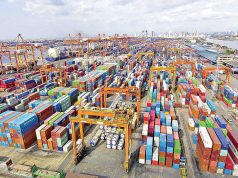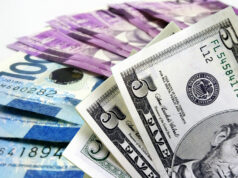Where the Philippines leads, the US now follows
One thing that astonishes many Americans (by which here meant citizen of the United States) is how close Filipinos feel towards the “land of the free.” Ride a taxi, listen to the radio, grab a bite at the nearest fastfood joint, read a newspaper, the similarities, the feel, of the US is palpable. Actually, all too real.
Thus, expectedly, the Pew Research Center reported in 2017 that: “Despite efforts by Duterte to build better relations with China, Filipinos’ attitudes toward China and its leader have not changed much since 2015.” Noting that the Philippines is actually the “most pro-Trump nation in Pew Research Center’s spring 37-country survey,” more importantly, “the Philippines still support the U.S. military presence in the region and say that the U.S. would defend them should they get into a conflict with China.”
Indeed, the general rule used to be that wherever the US goes, so goes the Philippines 2 or 3 quarters later.
In 1960, the US elected a charismatic young senator, war hero, and book author to the White House, transforming the latter into some sort of modern day “Camelot.” The Philippines five years later promptly elected a charismatic young senator, war hero (alleged), and lawyer to Malacañan, and turned the latter into some sort of “Malakas/Maganda fantasy.”
In 2000, the US sent the son of a former president to their nation’s highest office. In 2001, the Philippines would do the same, installing (then in 2004 electing) a daughter of a former president to such highest office.
In 2008, the US chose for president an unproven young senator, good at oratory but short in actual accomplishments. In 2010, the Philippines got Noynoy.
However, that was before. The Philippines now has seemingly reversed the situation: it leads and the US follows. But leads not in a good way.
In the years between 2010 and 2016, the state of governance, political discourse, and social interaction so deteriorated to the point of utter irrational incivility. People shrilly engaged each other in social media, and political positions became more entrenched the less logical that position became.
Alexandria Ocasio-Cortez? The Philippines has had nuttier, more unstable ideologues in public office and dominating social media way before AOC crashed into the public scene.
In matters of faith, cafeteria Catholics — supported by some complacent compliant clergy — insisted on their feelings (which they mislabel as “conscience”) rather than Church teachings.
Hence, as David Koyzis (“Liberalism and the Church,” First Things, June 2015) points out: “It is common these days to hear people claim to be spiritual but not religious. Mere spirituality leaves the ego in charge, and successful churches try their best to appeal to this ego. On the other hand, religion implies a certain binding (Latin: religare) of the person to a particular path of obedience not set by the person herself.”
In 2012, Mark Judge (“America has changed, but God hasn’t”) presciently described a country whose decline mirrored ours: “The truth is that America is now a leftist country. It’s Rachel Maddow and Jeremiah Wright’s country. You know that divorced fortysomething female neighbor of yours? The one who’s not half as bright as she thinks she is, and doesn’t know much about Libya or the national debt, but watches Katie Couric’s new show and just kind of didn’t like Romney because she, well, just kind of didn’t like him? America is now her country. It’s Dingbatville.”
Yet, to emphasize, it’s the Philippines blazing the way and not the US. The insanity, venom, and pettiness of the six years from 2010 culminated in one of the most bizarre, erratic, and vulgar Philippine election campaigns ever, resulting in Rodrigo Duterte as president. The US followed later with Donald Trump.
But the pettiness and selfish politicking did not end in 2016: the refusal to accept the results of the elections, the constant call for impeachment, and obstructionism by the opposition Liberal Party continued unabated; this to be mirrored 2 years later by the pettiness and selfish politicking (i.e., the refusal to accept the results of the elections, the constant call for impeachment, and obstructionism) by the opposition liberal Democrat Party in the US.
Perhaps it’s the huge diaspora abroad of the Philippines; perhaps it’s the inherent cosmopolitanism of the Filipino, enabling him to quickly and effortlessly absorb cultures, language, and attitudes of other countries. Perhaps it’s something else.
Whatever the reason, the Filipino definitely did not cause today’s sorry societal and political state. More likely it became a most predictive bellwether.
Earlier than everybody else, it internalized what would happen if cultures, faiths, and beliefs blended in one country by way of a politically correct multiculturalism (rather than integration or — even better — assimilation).
The result of such multiculturalism is the Philippines unfortunately proving (and which the US is following, unless it wakes up and starts leading again) that old dictum: a country that doesn’t stand for anything will fall for anything.
Jemy Gatdula is a senior fellow of the Philippine Council for Foreign Relations and a Philippine Judicial Academy law lecturer for constitutional philosophy and jurisprudence.
jemygatdula@yahoo.com
www.jemygatdula.blogspot.com
facebook.com/jemy.gatdula
Twitter @jemygatdula



